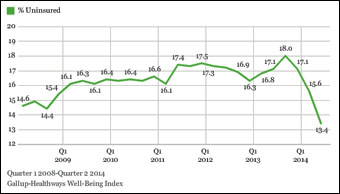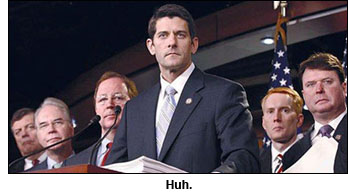NATIONAL
The ACA is working and its users are happy (but not the GOP)
By DAVID GROVES
The Stand
 WASHINGTON, D.C. (July 11, 2014) — The percentage of Americans lacking health insurance is plummeting thanks to the Affordable Care Act, according to three national surveys released on Thursday.
WASHINGTON, D.C. (July 11, 2014) — The percentage of Americans lacking health insurance is plummeting thanks to the Affordable Care Act, according to three national surveys released on Thursday.
The Urban Institute reports that the uninsured rate fell to 13.9% in June, down from 17.4% at the end of last year, and that some 8 million adults gained coverage. Gallup finds that the percentage of Americans lacking health coverage fell to 13.4% in the second quarter. And the Commonwealth Fund says about 9.5 million fewer adults were uninsured, led mainly by young adults age 19 to 34, who saw their uninsured rate drop to 18%, from 28%.
The Commonwealth Fund also reported on Thursday that 74% of newly insured Republicans are happy with the plans they bought. Overall, 77% of people who had insurance prior to the ACA’s rollout said they are pleased with the new coverage they obtained in the last year.
“It seems that once enrolled, whatever uncertainties or ideological opposition people might have to health reform largely melts away,” writes The New York Times in an editorial today, adding:
Many people who gained new insurance coverage reported that their health was fair or poor or that they had at least one chronic disease; most said they were better off now than before. Even those who had no health problems said they were better off. The reform effort is off to a very good start, especially in states determined to take full advantage of the new law.
 All of this might explain why Congressional Republicans, who have dedicated more than four years to single-minded opposition to the ACA — including more than 50 votes to defund or repeal it — have pretty much stopped talking about it. The Sunlight Foundation reports that members of Congress mentioned the word “Obamacare” in floor speeches just 171 times in June, down from their peak in September 2013, when Congress mentioned it 2,753 times.
All of this might explain why Congressional Republicans, who have dedicated more than four years to single-minded opposition to the ACA — including more than 50 votes to defund or repeal it — have pretty much stopped talking about it. The Sunlight Foundation reports that members of Congress mentioned the word “Obamacare” in floor speeches just 171 times in June, down from their peak in September 2013, when Congress mentioned it 2,753 times.
Even the Republicans’ mid-term election assault of political ads against the ACA have failed to hinder the program’s popularity. The Brookings Institute reports that some $450 million has been spent already on such ads, but it hasn’t made a dent in enrollment numbers in the most-targeted states. In fact, they say, there may be a “a positive association between the anti-ACA spending and ACA enrollment… (and) anti-ACA ads may unintentionally increase the public awareness about the existence of a governmentally subsidized service and its benefits for the uninsured.”
Pulitzer Prize-winning economist Paul Krugman of The New York Times recently tallied at least six distinct predictions of Obamacare doom made by Republicans, not one of which has come true. They are:
1. Enrollment will be very low. (Reality: see above.)
2. Even if people sign up, they won’t pay their premiums. (Reality: Signups exceeded expectations, and the vast majority paid.)
3. More people will lose coverage cancelled by the ACA than gain it. (Reality: see above.)
4. Rate shock. (Reality: Rates have indeed turned out to be affordable.)
5. Young people not signing up, and death spiral. (Reality: Pretty good demographics.)
6. Soaring health costs. (Reality: Costs are below anyone’s expectations.)
So after going 0 for 6 with their doomsday predictions and wasting years railing against the ACA at the expense of more pressing Congressional issues like immigration reform and infrastructure investment, what does the Republican Party do now?
Sue the president for delaying the ACA’s implementation. The Hill reports today:
Speaker John Boehner’s (R-Ohio) lawsuit against President Obama will… challenge the administration’s decision to unilaterally delay a requirement that firms offer health insurance to their employees or pay a penalty… Boehner aides disputed any irony in suing the president to implement an ObamaCare provision that they do not support.
P.S. Today from the Puget Sound Business Journal — Federal money adds 24 new medical residencies in Washington state’s most doctor-starved regions:
As of this year, 24 new primary care residency spots will have been created in Washington through a five-year federal program dedicated to getting doctors to regions that need it most… It’s never been more important for Washington to grow its pipeline of new doctors, particularly in underserved urban and rural areas. The state’s projected doctor shortage has Washington State University considering opening its own medical school in Spokane.
This program was created in 2010 as part of the Affordable Care Act.





